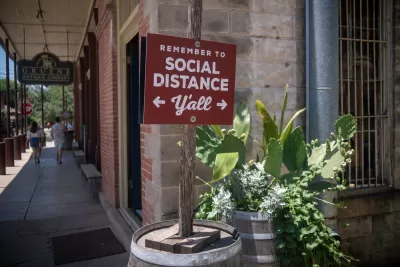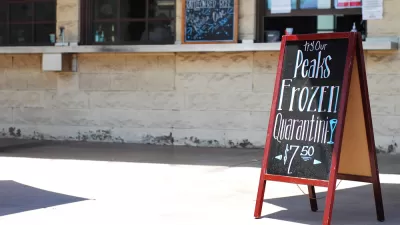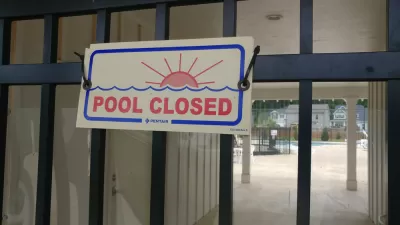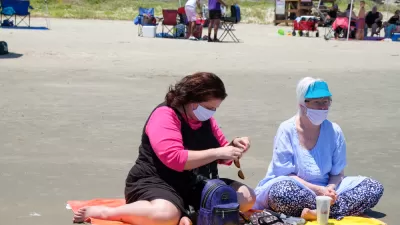Coronavirus cases are surging throughout the South and West. With growing hospitalizations threatening the capacity of the health care systems in major cities in Texas, Gov. Gregg Abbott pressed 'pause' on the state's reopening plan.

"Gov. Greg Abbott (R) announced Thursday that Texas would delay moving into its next phase of reopening as it struggles to contain a surge in coronavirus infections and hospitalizations," reports Kim Bellware for The Washington Post.
“The last thing we want to do as a state is go backwards and close down businesses,” Abbott said in a statement Thursday. “This temporary pause will help our state corral the spread until we can safely enter the next phase of opening our state for business.”
The rolling average of daily new cases in Texas has increased 62 percent from the last week, jumping from 2,610 on June 18 to 4,227 as of Thursday, according to data tracked by The Washington Post.
As cases grow, hospitals begin to fill up.
"Statewide, the number of hospitalizations has reached record highs for two weeks, soaring to 4,739 on Thursday morning and tripling since Memorial Day," reports Sarah R. Champagne for The Texas Tribune. "On Wednesday, the state had 1,320 available intensive care unit [ICU] beds and nearly 13,000 available hospital beds, but with regional disparities."
In hard-hit areas, some hospitals have begun moving coronavirus patients from crowded ICUs to other facilities, and local leaders have warned that hospitals could get overwhelmed if the number of infections keeps climbing. In the greater Houston area, the Texas Medical Center said Thursday that its intensive care units have reached 100% of base capacity.
Apocalyptic?
Dr. Peter Hotez, dean of the Houston-based National School of Tropical Medicine at the Baylor College of Medicine, warned that "Houston could be the hardest-hit city in the US with numbers rivaling those in Brazil," reports Jay Croft for CNN on June 25.
"The big metro areas seem to be rising very quickly and some of the models are on the verge of being apocalyptic," Hotez told CNN's Anderson Cooper...
"We're not seeing the deaths yet, but that will start," Hotez said. "Those deaths will start to mount up, I would say, in a couple of weeks."
According to Covid Act Now, a website designed to help elected officials determine the scope of the pandemic in their regions, "Texas is at risk of an outbreak." The warning: "COVID cases are either increasing at a rate likely to overwhelm hospitals and/or the state’s COVID preparedness is well below international standards."
It makes that assessment based on four pubic health indicators. Ironically, the only one it passes is ICU capacity: "Can likely handle a new wave of COVID."
Will pause be enough?
"Former Food and Drug Administration commissioner Scott Gottlieb warned Thursday that states such as Texas that have spiking infection rates would have to quickly implement policy changes to contain the outbreak in the weeks ahead," adds Bellware for the Post. Speaking on MSNBC, he also cautioned that the outcome of the next week or two is “already baked” in in hot spots.
Former Food and Drug Administration commissioner Scott Gottlieb warned Thursday that states such as Texas that have spiking infection rates would have to quickly implement policy changes to contain the outbreak in the weeks ahead. Gottlieb, speaking on MSNBC, also cautioned that the outcome of the next week or two is “already baked” in in hot spots.
Gottlieb didn't appear keen on shutting down businesses, largely because he believes there is no political will to do so, but he did offer a suggestion to governors that are seeing large increases in hospitalizations:
"I think they need to figure out where the spread is occuring; what the congregate settings are where the spread is actually occuring at the highest rate, and target interventions toward those venues. So if it's spreading in bars, they might have to shut down bars..."
That's exactly what the health district that overseas Boise, Idaho, did on Wednesday: they shut down bars and nightclubs in all of the state's most populous county.
Correspondent's note: The source article was posted at 10:12 am and may not appear among the "live updates" for June 25 titled, "U.S. sets another single-day record for coronavirus cases."
Related in Planetizen:
-
More than a Pause: Reversing the Reopening, June 24, 2020
-
[Oregon and Utah Press Pause on Reopening], June 15, 2020
FULL STORY: Texas pauses reopening amid surge in coronavirus cases and hospitalizations

Planetizen Federal Action Tracker
A weekly monitor of how Trump’s orders and actions are impacting planners and planning in America.

Map: Where Senate Republicans Want to Sell Your Public Lands
For public land advocates, the Senate Republicans’ proposal to sell millions of acres of public land in the West is “the biggest fight of their careers.”

Restaurant Patios Were a Pandemic Win — Why Were They so Hard to Keep?
Social distancing requirements and changes in travel patterns prompted cities to pilot new uses for street and sidewalk space. Then it got complicated.

Platform Pilsner: Vancouver Transit Agency Releases... a Beer?
TransLink will receive a portion of every sale of the four-pack.

Toronto Weighs Cheaper Transit, Parking Hikes for Major Events
Special event rates would take effect during large festivals, sports games and concerts to ‘discourage driving, manage congestion and free up space for transit.”

Berlin to Consider Car-Free Zone Larger Than Manhattan
The area bound by the 22-mile Ringbahn would still allow 12 uses of a private automobile per year per person, and several other exemptions.
Urban Design for Planners 1: Software Tools
This six-course series explores essential urban design concepts using open source software and equips planners with the tools they need to participate fully in the urban design process.
Planning for Universal Design
Learn the tools for implementing Universal Design in planning regulations.
Heyer Gruel & Associates PA
JM Goldson LLC
Custer County Colorado
City of Camden Redevelopment Agency
City of Astoria
Transportation Research & Education Center (TREC) at Portland State University
Camden Redevelopment Agency
City of Claremont
Municipality of Princeton (NJ)





























